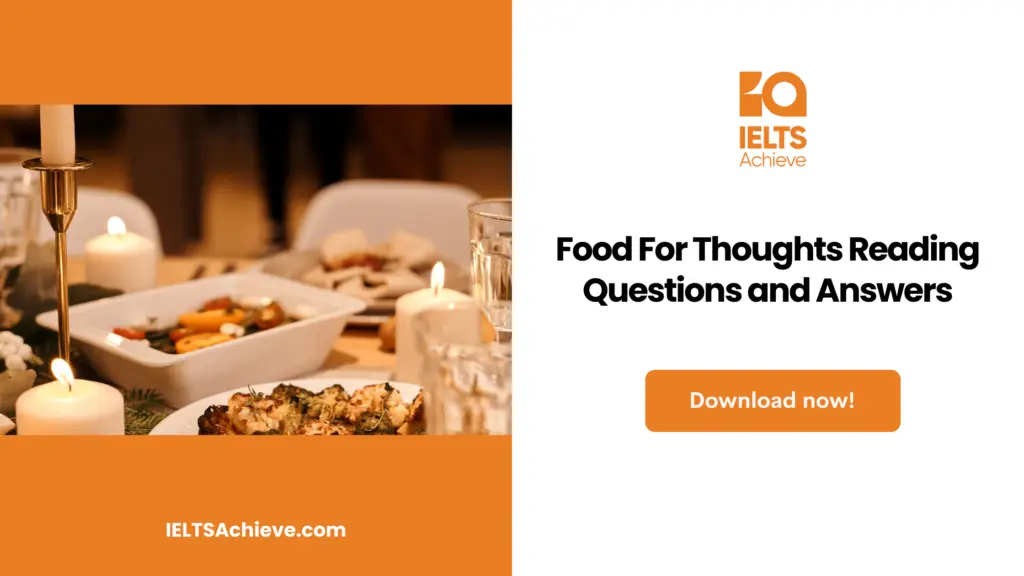The Blog post contains the following IELTS Reading Questions:
- IELTS Reading Matching Heading
- IELTS Reading Note Completion
- IELTS Reading Yes/No/Not Given
IELTS Reading Passage – How does the biological clock tick

How Does The Biological Clock Tick
As humans, we have a limited lifetime. This is universally acknowledged as being “biologically” plainly obvious. “Nothing is immortal!” However, whenever we hear this phrase, we generally think of technological objects that have been manufactured artificially and undergo normal wear and tear during their utilization. As a consequence, the object eventually stops functioning and thus becomes useless (death in the biological sense). But are technological device deterioration and loss of functionality and the demise of living beings identical or comparable.
Our “dead” products are closed systems that are “static.” It is always the foundational material that comprises the item, which, in the normal course of events, deteriorates and “ages.” According to the rules of physical chemistry and thermodynamics, “Agei” should occur in this situation. Even though a living creature is subjected to precisely the same rule, the output is not always inevitable. Because an organism is an open, dynamic system in which new material is constantly flowing, it can grow old without aging as long as it can regenerate itself. Thus, there is a constant dynamic balance between the production of fresh substances and the elimination of old material. The substance that a body is made of is constantly changing. Thus, our bodies constantly exchange old molecules for new ones, much like a spring whose form and motion are almost always maintained while its water molecules are constantly changing.
So, getting old and dying shouldn’t be considered inevitable, especially since the body has many ways to heal itself. A biological system does not, in theory, need to grow old and die. Nonetheless, a limited lifespan, aging, and ultimately death are universal aspects of living. The cause of this is simple to understand: In nature, existing species either adapt to their surroundings or give way to entirely new forms. These have new traits due to alterations in the genetic material (mutations). During the length of their individual lives, they are assessed for optimum or better adaption to environmental circumstances. The system requires space for new and improved life; immortality would disrupt it. The fundamental issue with evolution would be this.
Every living organism has a very distinct and unique life cycle. There are noticeable variances in lifespan amongst species, but still, the parameter is roughly constant within each species. For instance, there has been no significant change in the typical lifespan of mankind over thousands of years. Even though more and more individuals are living to a ripe old age because of advancements in medicine and nutrition, the typical upper limit for most people still seems to be 80 years. Another argument against the basic wear and tear concept is that the period in which an organism’s age ranges from a few days (or perhaps a couple of hours for unicellular organisms) to many thousands of years, as in the case of mammoth trees.
If a person’s life expectancy is a biological trait that is genetically determined, it is logically essential to suggest the presence of an internal clock that somehow monitors and regulates the aging process and ultimately decides death is the final step in a predefined program. Similar to how long a species lives, there is a clear mathematical link between body mass and metabolic rate. This relation is “inverted” in terms of lifespan: the bigger the organism, the lower its metabolic rate. In addition to being accurate for birds, this relationship is also valid for all other organisms on average within the systematic unit (plants, animals, and unicellular organisms).
Crocodiles and tortoises are two examples of animals that age gradually over time by using their energy “frugally.” Prey birds and parrots are often kept captive. As a result, they aren’t able to “experience life,” and as a consequence, they live long lives in confinement. Bats and hedgehogs are two examples of animals that conserve energy through lethargy or hibernation and live significantly longer than animals that are continuously active. Mice’s metabolic rate could be lowered by consuming extremely less food (hunger diet). They may then outlive their well-fed companions by two times. Compared to males, women age more visibly (roughly around 10%). If you compare the two genders’ metabolic rates, you’ll find that the shorter lifespan of men may be partly explained by the high metabolic rate of men. In other words, they live life very energetically—more passionately, but for a short time.
From the above, it follows that judicious utilization of energy reserves would help to prolong life. Extremely demanding sports may lead to the most efficient cardiovascular performance, but they most definitely do not extend life. Getting sufficient sleep, relaxing, and having a generally calm and balanced nature can lower metabolic rates. With a bit of self-observation, critical self-control, and, most importantly, logical consistency, each one of us can construct his or her own “energy-saving plan.” Experience will illustrate that adopting such a lifestyle not only elongates life span but also promotes good health. This last element really should not be neglected.
Unlock your full potential in the IELTS Reading section – Visit our IELTS Reading Practice Question Answer page now!
Recommended Questions:
Renewable Energy IELTS Reading Question with Answer
How Does The Biological Clock Tick Reading Questions
Questions 1 – 6
Reading Passage has seven paragraphs, A – G. Choose the correct heading for paragraphs B – G from the list of heading below.Write the correct number, i-x, in boxes 1-6 on your answer sheet.
| List of Headings i. The process of aging in men and women ii. Fundamental variations in the aging process of objects and living beings iii. Extending your life iv. The biological clock v. Energy consumption vi. The repairing of genetic material vii. Constraints of life span viii. Why is death advantageous ix. Steady life duration in spite of improvements x. The development methods of various species |
Example: Answer
Paragraph A: v
- Paragraph B
- Paragraph C
- Paragraph D
- Paragraph E
- Paragraph F
- Paragraph G
Ready to conquer Matching Headings questions? Click here to learn essential tips and techniques for matching headings accurately to paragraphs or sections in the IELTS Reading section.
Questions 7 – 10
Complete the notes below. Choose NO MORE THAN TWO WORDS from the passage for each answer.
7. ______ would create a serious issue for the concept of evolution.
8. _______ and 9. ________ are the principles according to which objects grow older.
Organisms can 10. _____ better to their surroundings because of mutations.
Boost your performance in Summary, Notes, Table, and Flowchart Completion tasks. Click here to explore our detailed guide and learn how to effectively complete summaries, notes, tables, and flowcharts in the IELTS Reading section.
Questions 11 – 14
Do the following statements agree with the views of the writer in Reading Passage. In boxes, 11 – 14 on your answer sheet, write
YES if the statement agrees with the views of the writer
NO if the statement contradicts the views of the writer
NOT GIVEN if there is no information about this in passage
11. Approximately 90 percent of the human body is replaced by new substances, within seven years.
12. The concept of wear and tear applies to artificial things as well as biological systems.
13. Saving and storing energy helps prolong a human being’s life.
14. In theory, it is feasible that a living organism may grow old without aging.
Want to excel in identifying the writer’s views and claims? Click here to explore our in-depth guide on how to accurately determine Yes, No, or Not Given in the IELTS Reading section.
Unlock your full potential in the IELTS Reading section – Visit our IELTS Reading Practice Question Answer page now!
Recommended Questions:
Renewable Energy IELTS Reading Question with Answer
How does the biological clock tick reading answers
1. ii
2. viii
3. ix
4. iv
5. v
6. iii
7. Immortality
8. Physical chemistry/Thermodynamics
9. Physical chemistry/Thermodynamics
10. adapt
11. Not Given
12. No
13. Yes (H6)
14. Yes

We hope you found this post useful in helping you to study for the IELTS Test. If you have any questions please let us know in the comments below or on the Facebook page.
The best way to keep up to date with posts like this is to like us on Facebook, then follow us on Instagram and Pinterest. If you need help preparing for the IELTS Test, join the IELTS Achieve Academy and see how we can assist you to achieve your desired band score. We offer an essay correction service, mock exams and online courses.


